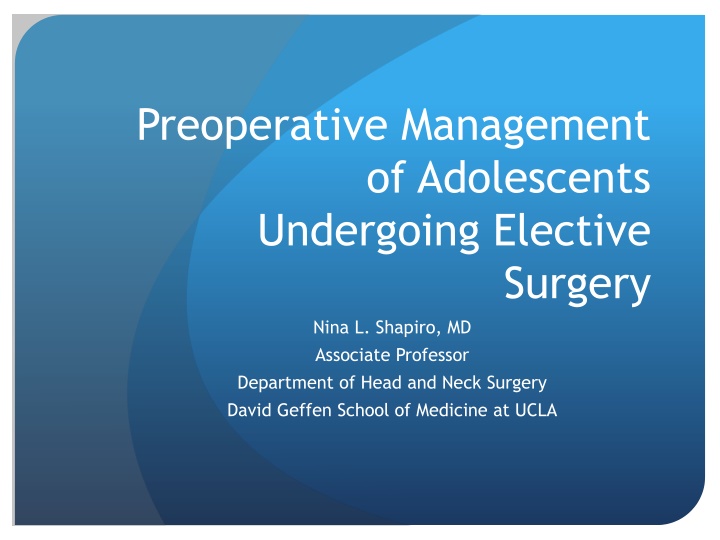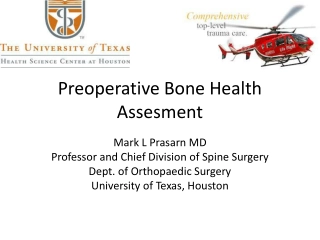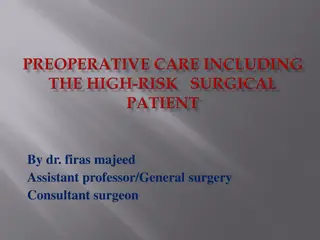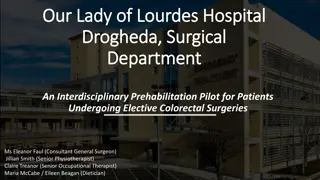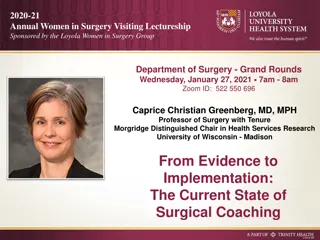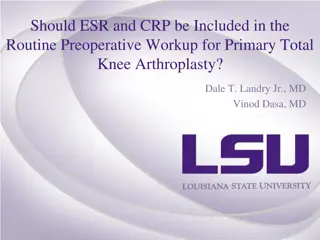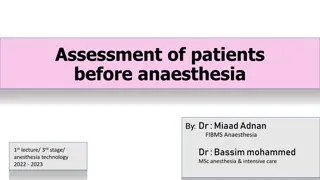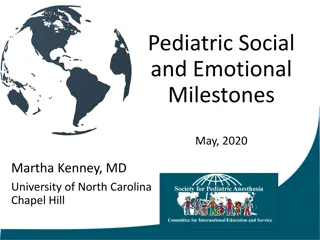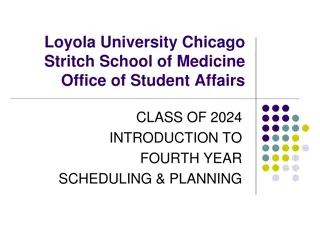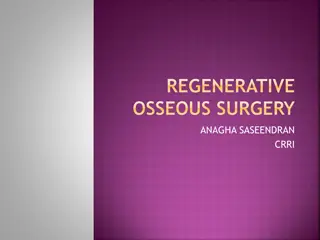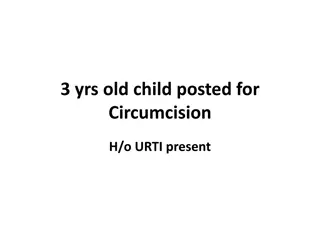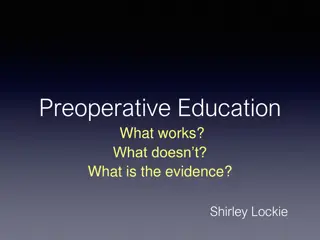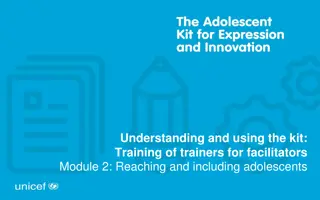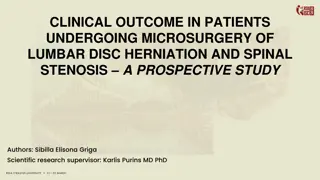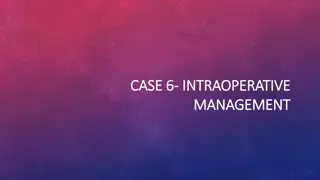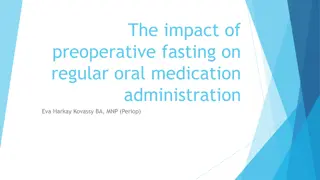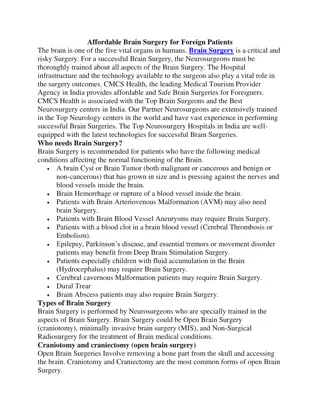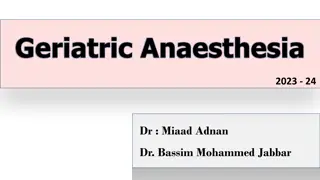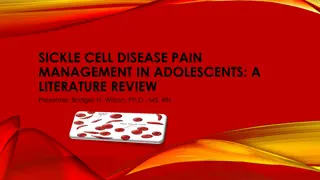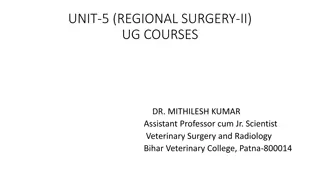Preoperative Management of Adolescents Undergoing Elective Surgery
Addressing the specific needs and challenges in managing adolescents preoperatively, including considerations like informed consent, ethical dilemmas, and patient refusal in surgical procedures. The article explores the complexities involved in surgical decision-making for teenagers and offers insights into handling such situations effectively to ensure optimal patient care.
Download Presentation

Please find below an Image/Link to download the presentation.
The content on the website is provided AS IS for your information and personal use only. It may not be sold, licensed, or shared on other websites without obtaining consent from the author.If you encounter any issues during the download, it is possible that the publisher has removed the file from their server.
You are allowed to download the files provided on this website for personal or commercial use, subject to the condition that they are used lawfully. All files are the property of their respective owners.
The content on the website is provided AS IS for your information and personal use only. It may not be sold, licensed, or shared on other websites without obtaining consent from the author.
E N D
Presentation Transcript
Preoperative Management of Adolescents Undergoing Elective Surgery Nina L. Shapiro, MD Associate Professor Department of Head and Neck Surgery David Geffen School of Medicine at UCLA
Preoperative Management of Adolescents Particular needs of this patient population Particular challenges of this patient population Wide variation in physician practice management Few standards to handle these challenges
Peri-operative Considerations for Teenagers Informed Consent/Assent Pregnancy Drug Use Ethical or Legal Dilemmas?
Informed Consent A person s agreement to allow or undergo medical treatment or surgery that is based on a FULL disclosure of the facts needed to make that decision intelligently Informed consent discussions with minors should be conducted at a level that can be understood by the minor
Patient A 13-year-old boy presents for sinus surgery. On the day of surgery he answers all questions appropriately, but when asked if he has any questions he says no because he is NOT having surgery. He states that this surgery is not necessary and I don t want it . Parents insist that it must be done today.
Children who refuse surgery 2007 Survey of SPA Members: Response from 453/852 9% cancelled >1 case/year 25% cancelled >1 case/5 years 45% cancelled >1 case/career THOSE WITH MOSTLY PEDIATRIC PRACTICE WERE TWICE AS LIKELY TO HAVE CANCELLED A CASE THOSE IN PRACTICE LONGER WERE MORE LIKELY TO INCLUDE CHILD IN DECISION OVERALL 57% UNSURE WHAT TO DO
Patient Refusal: APSA vs. ASPO Survey of pre-operative adolescent care of APSA and ASPO members 108/698 APSA members (15.5%) 51/380 ASPO members (13.4%) Would you cancel an elective surgery if adolescent refuses? ASPO: 49% Never APSA: 79% Never
Children who refuse Restraint 44% anesthesiologists use restraint in majority of patients under age 1 year 2% use restraint in patients over 11 years Median age SPA members consider a child s refusal: 12 years
Right to Refuse Competent adults may refuse treatment at any stage Coercion may be considered assault AAP Policy Statement Informed consent, parental permission, and assent in pediatric practice There are clinical situations in which a refusal to assent (or dissent) may be ethically binding
Informed consent for (not by) minors Informed consent is given based upon a clear appreciation and understanding of the facts, implications, and future consequences of an action When a parent signs an informed consent, full disclosure from a minor to a parent must occur. DOES THIS HAPPEN??
Patient 13-year-old for tonsillectomy LMP unknown Boyfriend with the family in preop area Do you ask about possibility of pregnancy? Or perform routine UCG? At what age? What do you do with the information?
Teen Pregnancy by the Numbers U.S. has the highest teen pregnancy rate of industrialized nations 75.4 pregnancies per 1000 girls (1 million/year) 34% become pregnant at least once before age 20
Pregnancy and Anesthesia No real evidence that pregnancy is harmful to the developing fetus No real evidence that it is not Surgical/diagnostic study risks to pregnancy Cannot control for other insults hypoxia, hypercapnia, temperature control, meds, etc
SAB and Low Birth weight Women requiring non-obstetric surgery during pregnancy Lowest rate of preterm birth if surgery in 2ndtrimester (11%) GA associated with lower birth weight (3053g vs. 3515g, p=0.01) Longer, intra-abdominal, GA were independent risk factors
Barriers to Adolescents Plan B needs prescription Fear of negative attitudes from physicians Belief that early care is unimportant Inexperience in medical care Lack of education Leads to inadequate care
The Law/Un-informed Consent California law: A health care provider is NOT permitted to share information of records regarding the prevention or treatment (or diagnosis) of a minor s pregnancy with a parent or legal guardian without the minor s written authorization.
HIPAA/ California Law Providers who reveal confidential information in violation of California s Confidentiality of Medical Information Act and HIPAA can be found guilty of unprofessional conduct and can held criminally and civilly liable, and may loose their medical license.
Practice vs. Ethics (ASA) Practice: Need for testing pts even if deny possible pregnancy Test all females vs. Informed refusal of test Ethics: Personal information that belongs to patient Right to proceed with anesthesia and surgery if she desires Testing offered but not required?
Options Educational information during office visit Questionnaire without parental presence Thorough history Importance of full disclosure Confidentiality and judgment-free discussion Universal testing UCLA: all females ages 10-53 yo
ASPO and APSA: Pregnancy 65% of ASPO and APSA members ask about possibility of pregnancy always 70% of ASPO and APSA members always get pregnancy test ASPO members more likely than APSA to change their plan for surgery after learning that a patient was pregnant (p=0.007). Physicians in private practice (ASPO and APSA) more likely to cancel elective surgery in pregnant patient than those in University or Childrens Hospitals.
Pre-Operative Pregnancy Dilemma If we test all adolescents, what do we do with the results? If we do not tell the family, are they giving informed consent?
Patient 15 yo for ESS for chronic sinusitis calls surgeon with concerns regarding risks of drug use and anesthesia and asks how long he must be clean before having surgery. Patient was told an arbitrary 1 month and case was rescheduled. On day of surgery, patient seems nervous
Drug Use Do you ask about drug use? Would you test this patient? Can you tell the family the results of the testing?
Drug use in teenagers: What are they doing?
CDC Survey: Ages 12-18 Alcohol 81% have had at least one drink 32% had first drink before age 13 31% had >5 drinks on >1 occasion in the 30 days prior to the survey Marijuana 47% have used 11% used before age 13 27% at least once in 30 days prior to survey
ASPO vs APSA Drug Screening 5-10% always speak with patient alone 25-40% always ask about alcohol/tobacco 20% always ask about drug use 10-20% always change surgical plan based on drug history Those with >15 years experience and higher percentage of adolescents in practice more likely to always ask about alcohol/tobacco (p<0.01)
Ethics vs. Law AAP Policy Statement Involuntary testing is not appropriate in adolescents with decisional capacity, even with parental consent, and should be performed only if there are strong medical or legal reasons to do so. Is preoperative state a strong medical reason?
California Law A minor who is >12 years old may consent to medical care and counseling relating to the diagnosis and treatment of a drug or alcohol-related problem. Any program receiving federal funding or registered with Medicare MAY NOT reveal any information to parents without minor s written consent.
What Do We Do? Educational information to patient/family during office visit Questionnaire without parental presence Parentectomy Thorough history on phone or in person prior to surgery, with importance of full disclosure Include confidentiality assurance and judgment-free discussion Drug testing prn
Conclusions Adolescent patients are a unique population who are developmentally capable of participating in their care and should be included in the preoperative discussion Physicians vary, based on specialty, practice setting, and experience, in how they involve adolescents in the decision-making process for surgery, and how they approach assent, pregnancy, and drug use
Conclusions The concept of assent is ethically and legally difficult to define Dissent or absolute refusal to give assent must be considered carefully before proceeding. Consider postponing elective cases Consider an ethics consult
Conclusions Risk of anesthesia and surgery on a fetus or pregnant individual, or risk of anesthesia with acute or chronic drug use is difficult (or impossible) to convey in informed consent when parent is signing consent without violating confidentiality
Conclusions Asking the right questions in the right setting will arm us with the knowledge needed to provide safe care for teens, and help parents make informed decisions. Involving adolescents in their preoperative care will enable them to better understand ramifications of surgery and anesthesia.
